Effective Communication Skills in the Workplace: An Essay Analysis
VerifiedAdded on 2023/01/17
|7
|1925
|98
Essay
AI Summary
This essay examines the critical role of interpersonal communication skills in professional settings, focusing on listening, feedback, and questioning. The essay begins by highlighting the importance of effective communication in any discipline. It then explores the skills of listening, emphasizing its role in gathering information, understanding non-verbal cues, and fostering collaboration. The essay also discusses the skill of questioning, its role in clarifying information, improving understanding, and promoting critical thinking. Furthermore, the essay examines the skill of feedback, detailing its use in performance improvement, strengthening working relationships, and providing insights. The essay provides examples within a laboratory context, illustrating how technicians can apply these skills to enhance teamwork, improve experiment outcomes, and communicate effectively with colleagues and patients. The essay concludes by summarizing the importance of these skills for professional success.
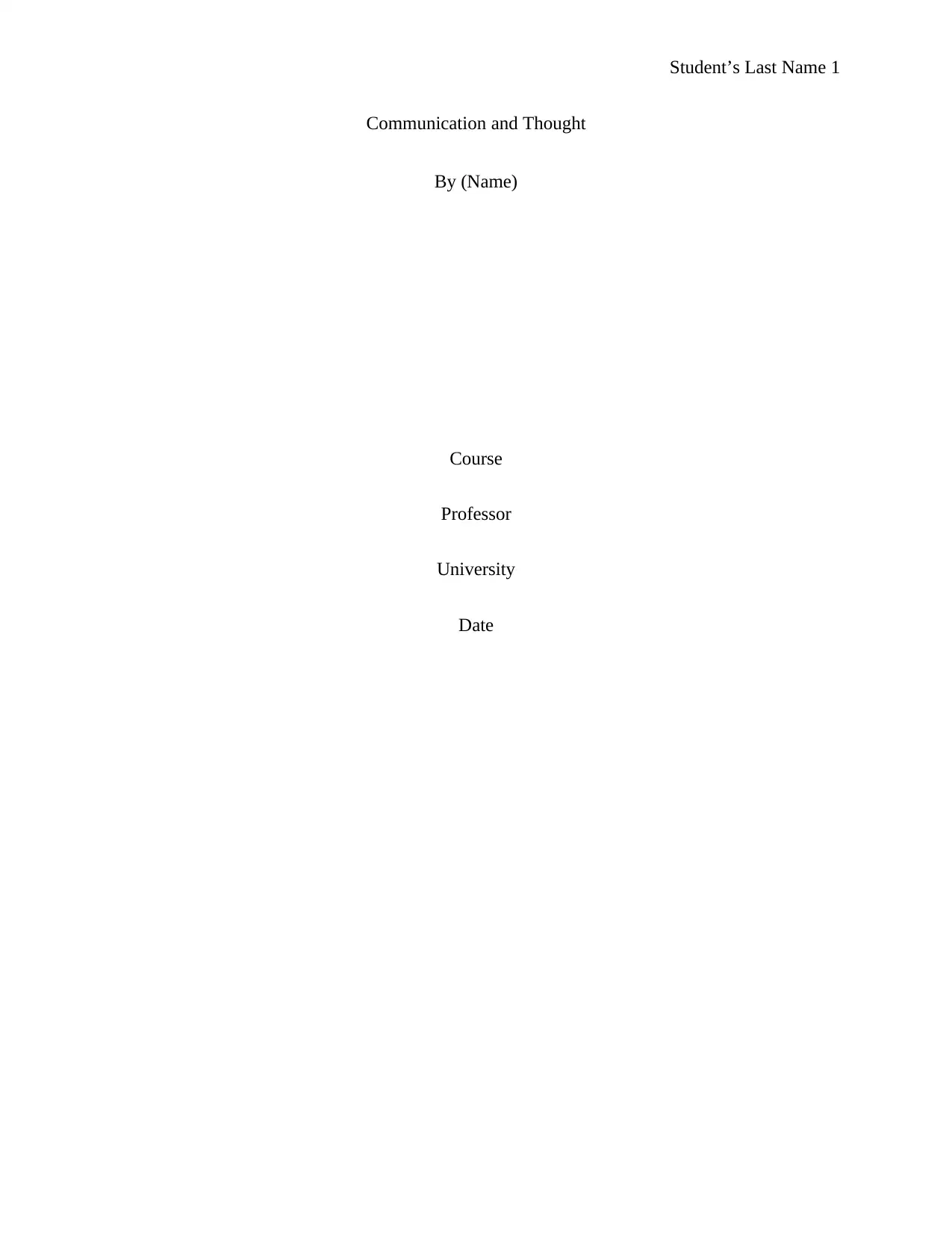
Student’s Last Name 1
Communication and Thought
By (Name)
Course
Professor
University
Date
Communication and Thought
By (Name)
Course
Professor
University
Date
Paraphrase This Document
Need a fresh take? Get an instant paraphrase of this document with our AI Paraphraser
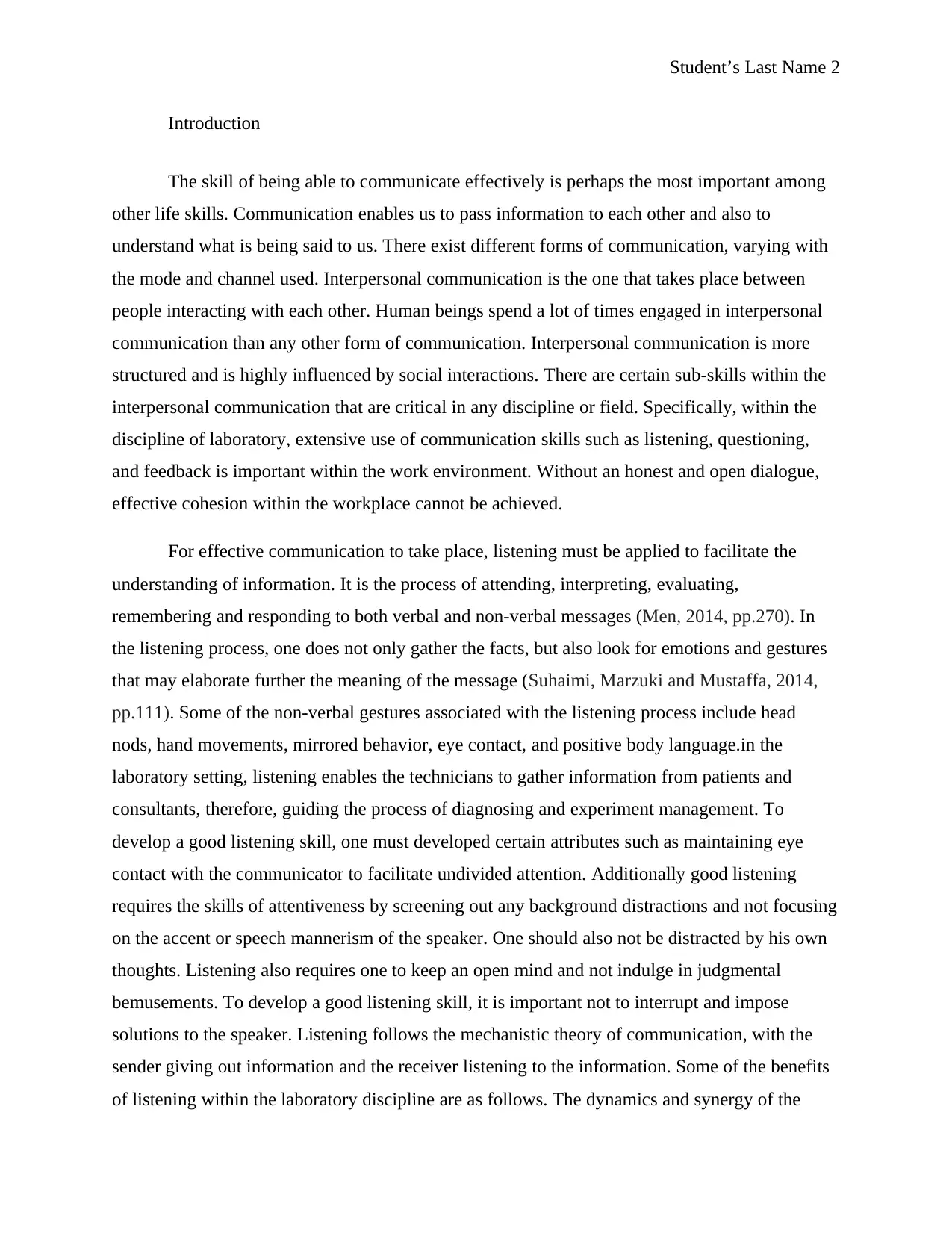
Student’s Last Name 2
Introduction
The skill of being able to communicate effectively is perhaps the most important among
other life skills. Communication enables us to pass information to each other and also to
understand what is being said to us. There exist different forms of communication, varying with
the mode and channel used. Interpersonal communication is the one that takes place between
people interacting with each other. Human beings spend a lot of times engaged in interpersonal
communication than any other form of communication. Interpersonal communication is more
structured and is highly influenced by social interactions. There are certain sub-skills within the
interpersonal communication that are critical in any discipline or field. Specifically, within the
discipline of laboratory, extensive use of communication skills such as listening, questioning,
and feedback is important within the work environment. Without an honest and open dialogue,
effective cohesion within the workplace cannot be achieved.
For effective communication to take place, listening must be applied to facilitate the
understanding of information. It is the process of attending, interpreting, evaluating,
remembering and responding to both verbal and non-verbal messages (Men, 2014, pp.270). In
the listening process, one does not only gather the facts, but also look for emotions and gestures
that may elaborate further the meaning of the message (Suhaimi, Marzuki and Mustaffa, 2014,
pp.111). Some of the non-verbal gestures associated with the listening process include head
nods, hand movements, mirrored behavior, eye contact, and positive body language.in the
laboratory setting, listening enables the technicians to gather information from patients and
consultants, therefore, guiding the process of diagnosing and experiment management. To
develop a good listening skill, one must developed certain attributes such as maintaining eye
contact with the communicator to facilitate undivided attention. Additionally good listening
requires the skills of attentiveness by screening out any background distractions and not focusing
on the accent or speech mannerism of the speaker. One should also not be distracted by his own
thoughts. Listening also requires one to keep an open mind and not indulge in judgmental
bemusements. To develop a good listening skill, it is important not to interrupt and impose
solutions to the speaker. Listening follows the mechanistic theory of communication, with the
sender giving out information and the receiver listening to the information. Some of the benefits
of listening within the laboratory discipline are as follows. The dynamics and synergy of the
Introduction
The skill of being able to communicate effectively is perhaps the most important among
other life skills. Communication enables us to pass information to each other and also to
understand what is being said to us. There exist different forms of communication, varying with
the mode and channel used. Interpersonal communication is the one that takes place between
people interacting with each other. Human beings spend a lot of times engaged in interpersonal
communication than any other form of communication. Interpersonal communication is more
structured and is highly influenced by social interactions. There are certain sub-skills within the
interpersonal communication that are critical in any discipline or field. Specifically, within the
discipline of laboratory, extensive use of communication skills such as listening, questioning,
and feedback is important within the work environment. Without an honest and open dialogue,
effective cohesion within the workplace cannot be achieved.
For effective communication to take place, listening must be applied to facilitate the
understanding of information. It is the process of attending, interpreting, evaluating,
remembering and responding to both verbal and non-verbal messages (Men, 2014, pp.270). In
the listening process, one does not only gather the facts, but also look for emotions and gestures
that may elaborate further the meaning of the message (Suhaimi, Marzuki and Mustaffa, 2014,
pp.111). Some of the non-verbal gestures associated with the listening process include head
nods, hand movements, mirrored behavior, eye contact, and positive body language.in the
laboratory setting, listening enables the technicians to gather information from patients and
consultants, therefore, guiding the process of diagnosing and experiment management. To
develop a good listening skill, one must developed certain attributes such as maintaining eye
contact with the communicator to facilitate undivided attention. Additionally good listening
requires the skills of attentiveness by screening out any background distractions and not focusing
on the accent or speech mannerism of the speaker. One should also not be distracted by his own
thoughts. Listening also requires one to keep an open mind and not indulge in judgmental
bemusements. To develop a good listening skill, it is important not to interrupt and impose
solutions to the speaker. Listening follows the mechanistic theory of communication, with the
sender giving out information and the receiver listening to the information. Some of the benefits
of listening within the laboratory discipline are as follows. The dynamics and synergy of the
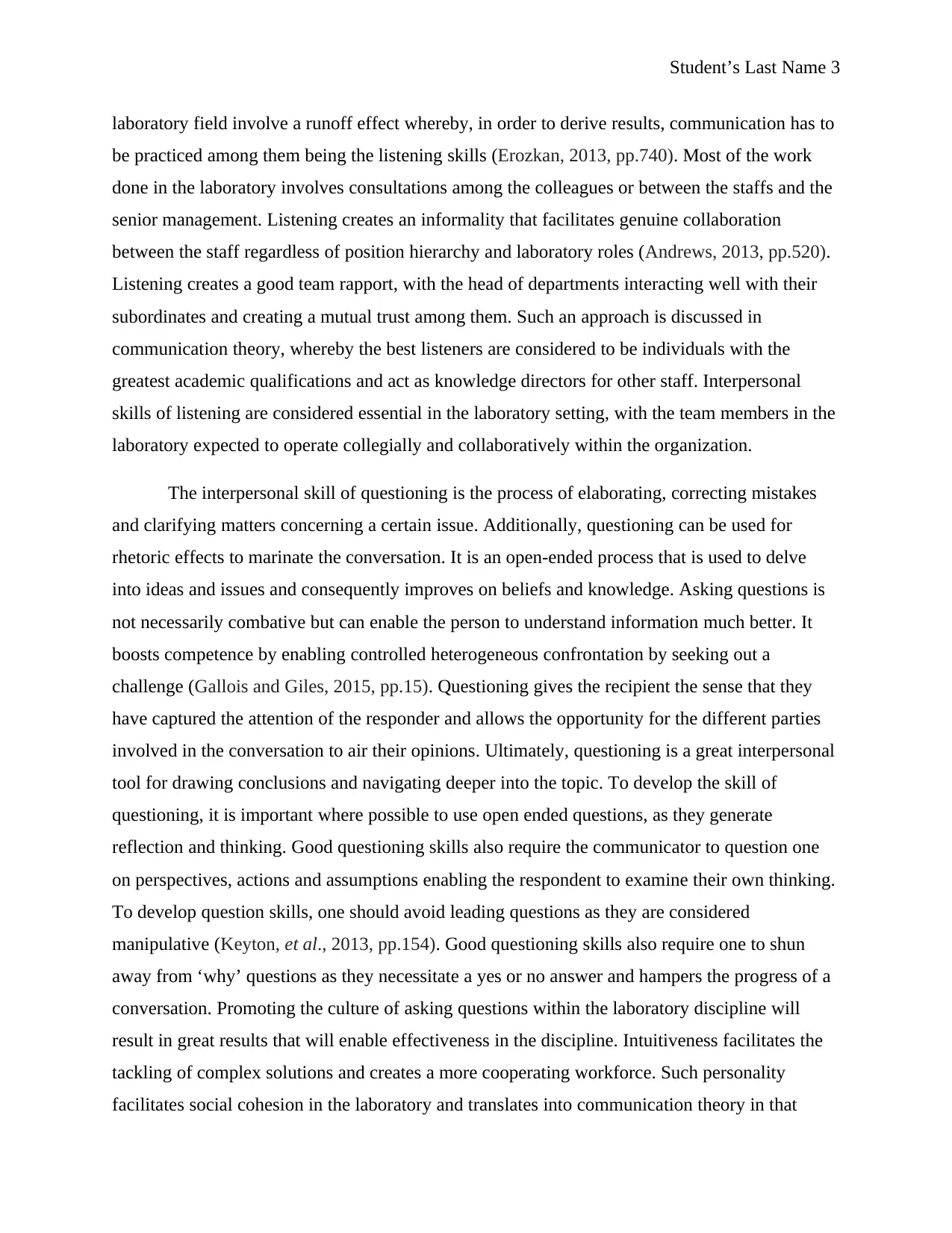
Student’s Last Name 3
laboratory field involve a runoff effect whereby, in order to derive results, communication has to
be practiced among them being the listening skills (Erozkan, 2013, pp.740). Most of the work
done in the laboratory involves consultations among the colleagues or between the staffs and the
senior management. Listening creates an informality that facilitates genuine collaboration
between the staff regardless of position hierarchy and laboratory roles (Andrews, 2013, pp.520).
Listening creates a good team rapport, with the head of departments interacting well with their
subordinates and creating a mutual trust among them. Such an approach is discussed in
communication theory, whereby the best listeners are considered to be individuals with the
greatest academic qualifications and act as knowledge directors for other staff. Interpersonal
skills of listening are considered essential in the laboratory setting, with the team members in the
laboratory expected to operate collegially and collaboratively within the organization.
The interpersonal skill of questioning is the process of elaborating, correcting mistakes
and clarifying matters concerning a certain issue. Additionally, questioning can be used for
rhetoric effects to marinate the conversation. It is an open-ended process that is used to delve
into ideas and issues and consequently improves on beliefs and knowledge. Asking questions is
not necessarily combative but can enable the person to understand information much better. It
boosts competence by enabling controlled heterogeneous confrontation by seeking out a
challenge (Gallois and Giles, 2015, pp.15). Questioning gives the recipient the sense that they
have captured the attention of the responder and allows the opportunity for the different parties
involved in the conversation to air their opinions. Ultimately, questioning is a great interpersonal
tool for drawing conclusions and navigating deeper into the topic. To develop the skill of
questioning, it is important where possible to use open ended questions, as they generate
reflection and thinking. Good questioning skills also require the communicator to question one
on perspectives, actions and assumptions enabling the respondent to examine their own thinking.
To develop question skills, one should avoid leading questions as they are considered
manipulative (Keyton, et al., 2013, pp.154). Good questioning skills also require one to shun
away from ‘why’ questions as they necessitate a yes or no answer and hampers the progress of a
conversation. Promoting the culture of asking questions within the laboratory discipline will
result in great results that will enable effectiveness in the discipline. Intuitiveness facilitates the
tackling of complex solutions and creates a more cooperating workforce. Such personality
facilitates social cohesion in the laboratory and translates into communication theory in that
laboratory field involve a runoff effect whereby, in order to derive results, communication has to
be practiced among them being the listening skills (Erozkan, 2013, pp.740). Most of the work
done in the laboratory involves consultations among the colleagues or between the staffs and the
senior management. Listening creates an informality that facilitates genuine collaboration
between the staff regardless of position hierarchy and laboratory roles (Andrews, 2013, pp.520).
Listening creates a good team rapport, with the head of departments interacting well with their
subordinates and creating a mutual trust among them. Such an approach is discussed in
communication theory, whereby the best listeners are considered to be individuals with the
greatest academic qualifications and act as knowledge directors for other staff. Interpersonal
skills of listening are considered essential in the laboratory setting, with the team members in the
laboratory expected to operate collegially and collaboratively within the organization.
The interpersonal skill of questioning is the process of elaborating, correcting mistakes
and clarifying matters concerning a certain issue. Additionally, questioning can be used for
rhetoric effects to marinate the conversation. It is an open-ended process that is used to delve
into ideas and issues and consequently improves on beliefs and knowledge. Asking questions is
not necessarily combative but can enable the person to understand information much better. It
boosts competence by enabling controlled heterogeneous confrontation by seeking out a
challenge (Gallois and Giles, 2015, pp.15). Questioning gives the recipient the sense that they
have captured the attention of the responder and allows the opportunity for the different parties
involved in the conversation to air their opinions. Ultimately, questioning is a great interpersonal
tool for drawing conclusions and navigating deeper into the topic. To develop the skill of
questioning, it is important where possible to use open ended questions, as they generate
reflection and thinking. Good questioning skills also require the communicator to question one
on perspectives, actions and assumptions enabling the respondent to examine their own thinking.
To develop question skills, one should avoid leading questions as they are considered
manipulative (Keyton, et al., 2013, pp.154). Good questioning skills also require one to shun
away from ‘why’ questions as they necessitate a yes or no answer and hampers the progress of a
conversation. Promoting the culture of asking questions within the laboratory discipline will
result in great results that will enable effectiveness in the discipline. Intuitiveness facilitates the
tackling of complex solutions and creates a more cooperating workforce. Such personality
facilitates social cohesion in the laboratory and translates into communication theory in that
⊘ This is a preview!⊘
Do you want full access?
Subscribe today to unlock all pages.

Trusted by 1+ million students worldwide
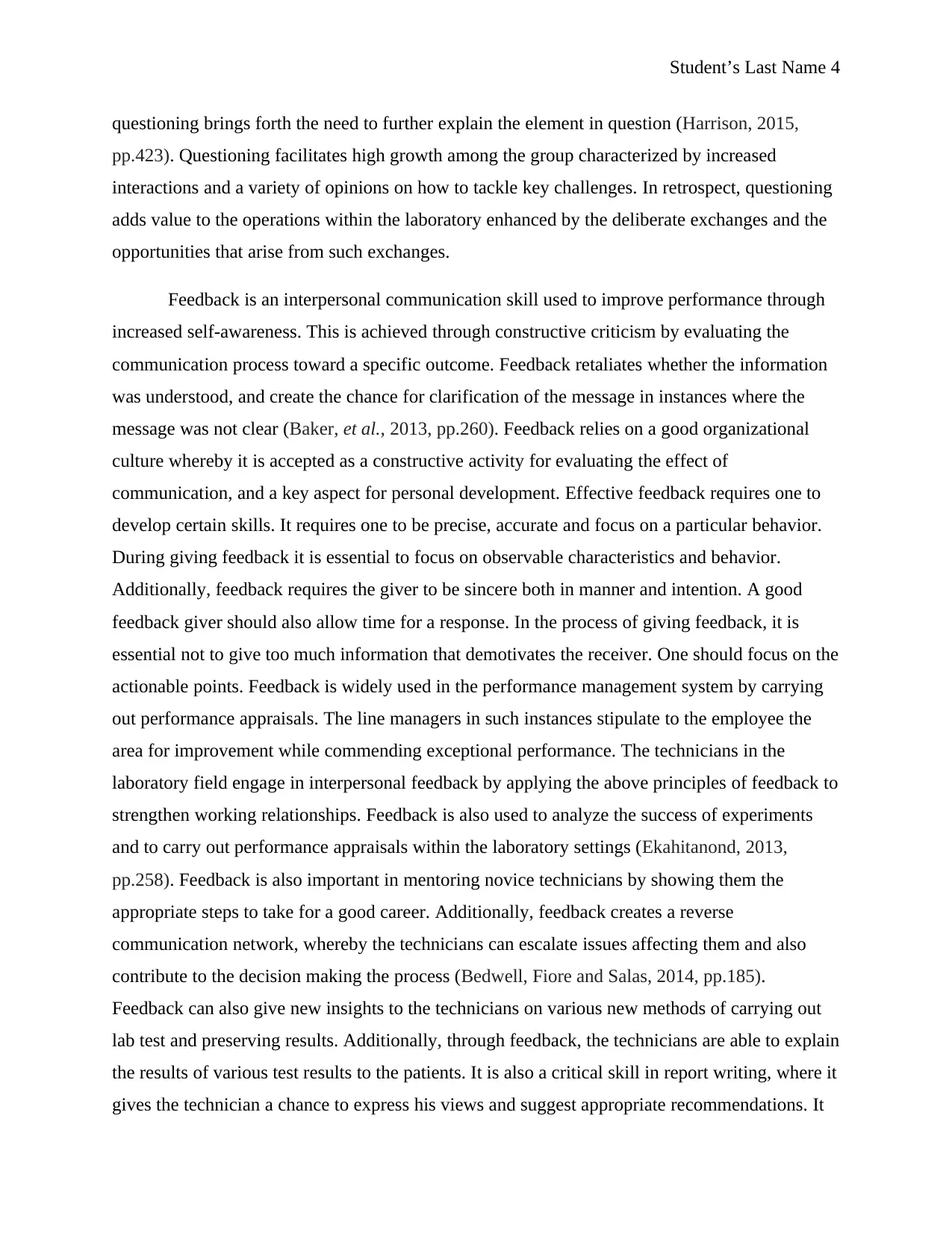
Student’s Last Name 4
questioning brings forth the need to further explain the element in question (Harrison, 2015,
pp.423). Questioning facilitates high growth among the group characterized by increased
interactions and a variety of opinions on how to tackle key challenges. In retrospect, questioning
adds value to the operations within the laboratory enhanced by the deliberate exchanges and the
opportunities that arise from such exchanges.
Feedback is an interpersonal communication skill used to improve performance through
increased self-awareness. This is achieved through constructive criticism by evaluating the
communication process toward a specific outcome. Feedback retaliates whether the information
was understood, and create the chance for clarification of the message in instances where the
message was not clear (Baker, et al., 2013, pp.260). Feedback relies on a good organizational
culture whereby it is accepted as a constructive activity for evaluating the effect of
communication, and a key aspect for personal development. Effective feedback requires one to
develop certain skills. It requires one to be precise, accurate and focus on a particular behavior.
During giving feedback it is essential to focus on observable characteristics and behavior.
Additionally, feedback requires the giver to be sincere both in manner and intention. A good
feedback giver should also allow time for a response. In the process of giving feedback, it is
essential not to give too much information that demotivates the receiver. One should focus on the
actionable points. Feedback is widely used in the performance management system by carrying
out performance appraisals. The line managers in such instances stipulate to the employee the
area for improvement while commending exceptional performance. The technicians in the
laboratory field engage in interpersonal feedback by applying the above principles of feedback to
strengthen working relationships. Feedback is also used to analyze the success of experiments
and to carry out performance appraisals within the laboratory settings (Ekahitanond, 2013,
pp.258). Feedback is also important in mentoring novice technicians by showing them the
appropriate steps to take for a good career. Additionally, feedback creates a reverse
communication network, whereby the technicians can escalate issues affecting them and also
contribute to the decision making the process (Bedwell, Fiore and Salas, 2014, pp.185).
Feedback can also give new insights to the technicians on various new methods of carrying out
lab test and preserving results. Additionally, through feedback, the technicians are able to explain
the results of various test results to the patients. It is also a critical skill in report writing, where it
gives the technician a chance to express his views and suggest appropriate recommendations. It
questioning brings forth the need to further explain the element in question (Harrison, 2015,
pp.423). Questioning facilitates high growth among the group characterized by increased
interactions and a variety of opinions on how to tackle key challenges. In retrospect, questioning
adds value to the operations within the laboratory enhanced by the deliberate exchanges and the
opportunities that arise from such exchanges.
Feedback is an interpersonal communication skill used to improve performance through
increased self-awareness. This is achieved through constructive criticism by evaluating the
communication process toward a specific outcome. Feedback retaliates whether the information
was understood, and create the chance for clarification of the message in instances where the
message was not clear (Baker, et al., 2013, pp.260). Feedback relies on a good organizational
culture whereby it is accepted as a constructive activity for evaluating the effect of
communication, and a key aspect for personal development. Effective feedback requires one to
develop certain skills. It requires one to be precise, accurate and focus on a particular behavior.
During giving feedback it is essential to focus on observable characteristics and behavior.
Additionally, feedback requires the giver to be sincere both in manner and intention. A good
feedback giver should also allow time for a response. In the process of giving feedback, it is
essential not to give too much information that demotivates the receiver. One should focus on the
actionable points. Feedback is widely used in the performance management system by carrying
out performance appraisals. The line managers in such instances stipulate to the employee the
area for improvement while commending exceptional performance. The technicians in the
laboratory field engage in interpersonal feedback by applying the above principles of feedback to
strengthen working relationships. Feedback is also used to analyze the success of experiments
and to carry out performance appraisals within the laboratory settings (Ekahitanond, 2013,
pp.258). Feedback is also important in mentoring novice technicians by showing them the
appropriate steps to take for a good career. Additionally, feedback creates a reverse
communication network, whereby the technicians can escalate issues affecting them and also
contribute to the decision making the process (Bedwell, Fiore and Salas, 2014, pp.185).
Feedback can also give new insights to the technicians on various new methods of carrying out
lab test and preserving results. Additionally, through feedback, the technicians are able to explain
the results of various test results to the patients. It is also a critical skill in report writing, where it
gives the technician a chance to express his views and suggest appropriate recommendations. It
Paraphrase This Document
Need a fresh take? Get an instant paraphrase of this document with our AI Paraphraser
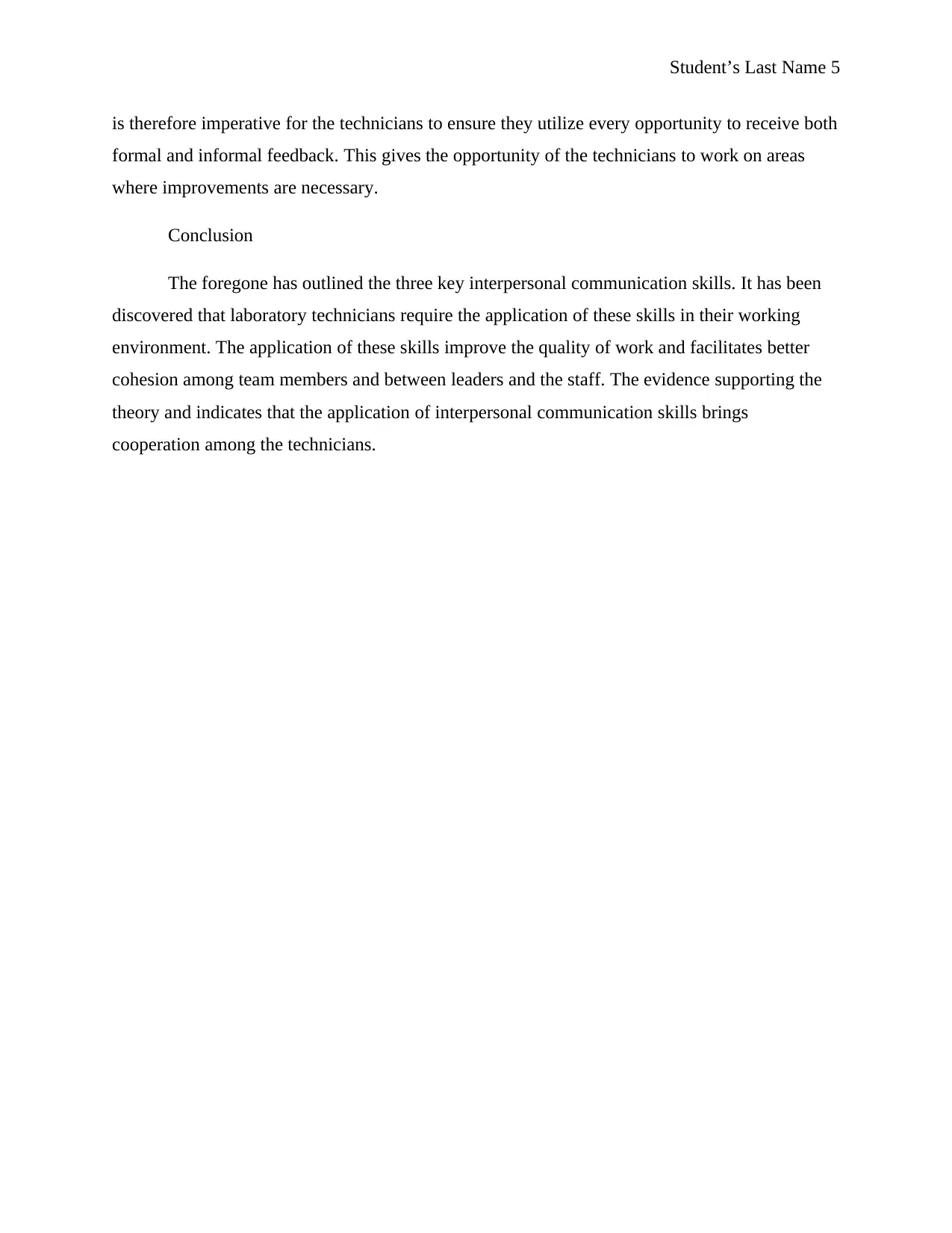
Student’s Last Name 5
is therefore imperative for the technicians to ensure they utilize every opportunity to receive both
formal and informal feedback. This gives the opportunity of the technicians to work on areas
where improvements are necessary.
Conclusion
The foregone has outlined the three key interpersonal communication skills. It has been
discovered that laboratory technicians require the application of these skills in their working
environment. The application of these skills improve the quality of work and facilitates better
cohesion among team members and between leaders and the staff. The evidence supporting the
theory and indicates that the application of interpersonal communication skills brings
cooperation among the technicians.
is therefore imperative for the technicians to ensure they utilize every opportunity to receive both
formal and informal feedback. This gives the opportunity of the technicians to work on areas
where improvements are necessary.
Conclusion
The foregone has outlined the three key interpersonal communication skills. It has been
discovered that laboratory technicians require the application of these skills in their working
environment. The application of these skills improve the quality of work and facilitates better
cohesion among team members and between leaders and the staff. The evidence supporting the
theory and indicates that the application of interpersonal communication skills brings
cooperation among the technicians.
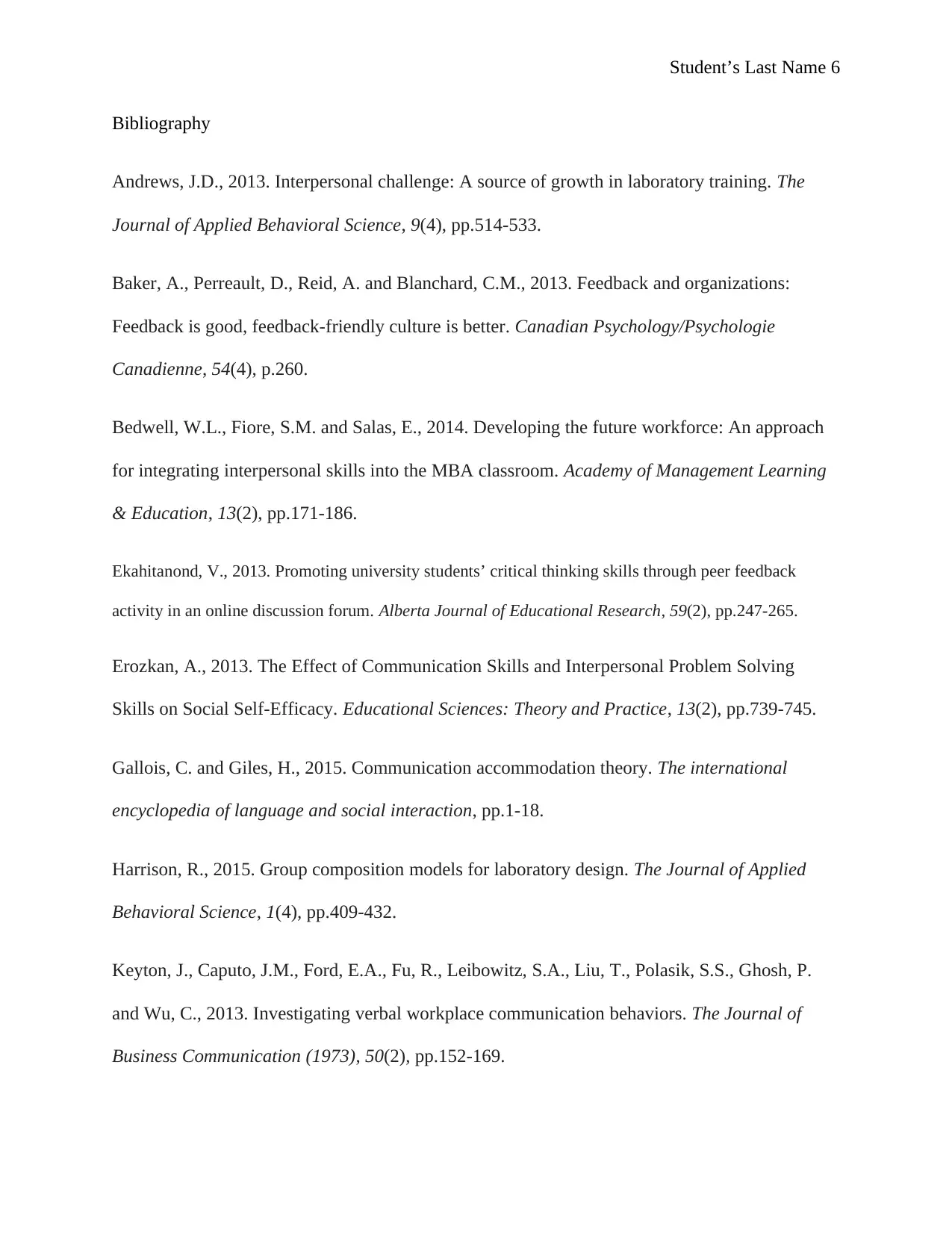
Student’s Last Name 6
Bibliography
Andrews, J.D., 2013. Interpersonal challenge: A source of growth in laboratory training. The
Journal of Applied Behavioral Science, 9(4), pp.514-533.
Baker, A., Perreault, D., Reid, A. and Blanchard, C.M., 2013. Feedback and organizations:
Feedback is good, feedback-friendly culture is better. Canadian Psychology/Psychologie
Canadienne, 54(4), p.260.
Bedwell, W.L., Fiore, S.M. and Salas, E., 2014. Developing the future workforce: An approach
for integrating interpersonal skills into the MBA classroom. Academy of Management Learning
& Education, 13(2), pp.171-186.
Ekahitanond, V., 2013. Promoting university students’ critical thinking skills through peer feedback
activity in an online discussion forum. Alberta Journal of Educational Research, 59(2), pp.247-265.
Erozkan, A., 2013. The Effect of Communication Skills and Interpersonal Problem Solving
Skills on Social Self-Efficacy. Educational Sciences: Theory and Practice, 13(2), pp.739-745.
Gallois, C. and Giles, H., 2015. Communication accommodation theory. The international
encyclopedia of language and social interaction, pp.1-18.
Harrison, R., 2015. Group composition models for laboratory design. The Journal of Applied
Behavioral Science, 1(4), pp.409-432.
Keyton, J., Caputo, J.M., Ford, E.A., Fu, R., Leibowitz, S.A., Liu, T., Polasik, S.S., Ghosh, P.
and Wu, C., 2013. Investigating verbal workplace communication behaviors. The Journal of
Business Communication (1973), 50(2), pp.152-169.
Bibliography
Andrews, J.D., 2013. Interpersonal challenge: A source of growth in laboratory training. The
Journal of Applied Behavioral Science, 9(4), pp.514-533.
Baker, A., Perreault, D., Reid, A. and Blanchard, C.M., 2013. Feedback and organizations:
Feedback is good, feedback-friendly culture is better. Canadian Psychology/Psychologie
Canadienne, 54(4), p.260.
Bedwell, W.L., Fiore, S.M. and Salas, E., 2014. Developing the future workforce: An approach
for integrating interpersonal skills into the MBA classroom. Academy of Management Learning
& Education, 13(2), pp.171-186.
Ekahitanond, V., 2013. Promoting university students’ critical thinking skills through peer feedback
activity in an online discussion forum. Alberta Journal of Educational Research, 59(2), pp.247-265.
Erozkan, A., 2013. The Effect of Communication Skills and Interpersonal Problem Solving
Skills on Social Self-Efficacy. Educational Sciences: Theory and Practice, 13(2), pp.739-745.
Gallois, C. and Giles, H., 2015. Communication accommodation theory. The international
encyclopedia of language and social interaction, pp.1-18.
Harrison, R., 2015. Group composition models for laboratory design. The Journal of Applied
Behavioral Science, 1(4), pp.409-432.
Keyton, J., Caputo, J.M., Ford, E.A., Fu, R., Leibowitz, S.A., Liu, T., Polasik, S.S., Ghosh, P.
and Wu, C., 2013. Investigating verbal workplace communication behaviors. The Journal of
Business Communication (1973), 50(2), pp.152-169.
⊘ This is a preview!⊘
Do you want full access?
Subscribe today to unlock all pages.

Trusted by 1+ million students worldwide
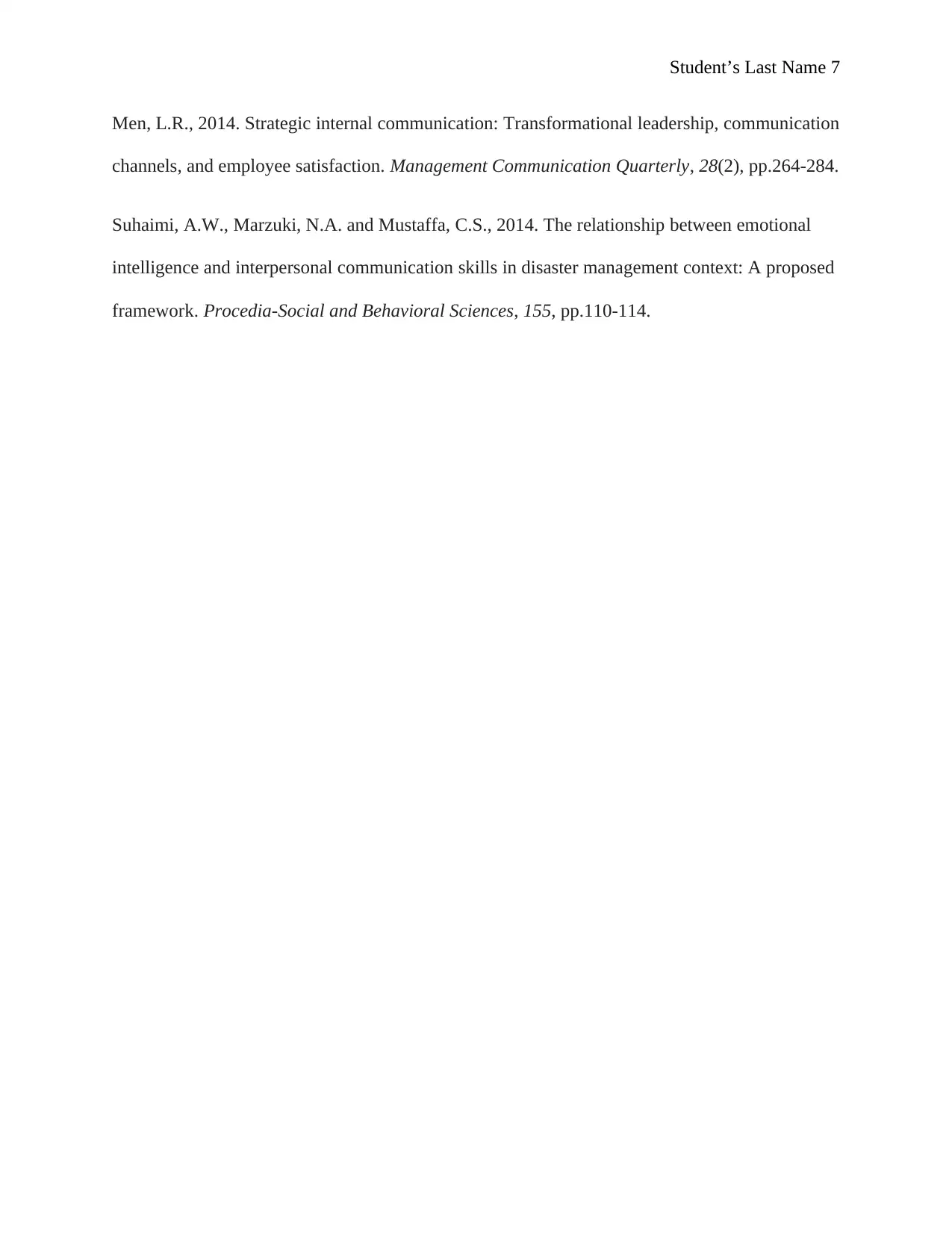
Student’s Last Name 7
Men, L.R., 2014. Strategic internal communication: Transformational leadership, communication
channels, and employee satisfaction. Management Communication Quarterly, 28(2), pp.264-284.
Suhaimi, A.W., Marzuki, N.A. and Mustaffa, C.S., 2014. The relationship between emotional
intelligence and interpersonal communication skills in disaster management context: A proposed
framework. Procedia-Social and Behavioral Sciences, 155, pp.110-114.
Men, L.R., 2014. Strategic internal communication: Transformational leadership, communication
channels, and employee satisfaction. Management Communication Quarterly, 28(2), pp.264-284.
Suhaimi, A.W., Marzuki, N.A. and Mustaffa, C.S., 2014. The relationship between emotional
intelligence and interpersonal communication skills in disaster management context: A proposed
framework. Procedia-Social and Behavioral Sciences, 155, pp.110-114.
1 out of 7
Related Documents
Your All-in-One AI-Powered Toolkit for Academic Success.
+13062052269
info@desklib.com
Available 24*7 on WhatsApp / Email
![[object Object]](/_next/static/media/star-bottom.7253800d.svg)
Unlock your academic potential
Copyright © 2020–2026 A2Z Services. All Rights Reserved. Developed and managed by ZUCOL.





